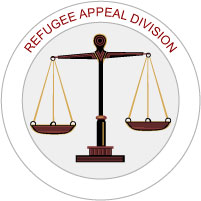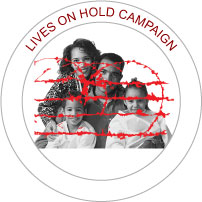***
CONTENTS:
- Legislation to implement Refugee Appeal Division dies at third reading
- Supreme Court intervention in case of extradition of a refugee
- Court demands fair treatment for Benamar Benatta
- Court strikes down Hassan Almrei’s security certificate
- Important message for Burundians, Rwandans and Liberians
- Report and Resolutions from the CCR Fall Consultation, 3-5 December 2009, Windsor
- Participate in the CCR Winter Working Group Meetings, 26-27 February, Toronto
- Faces of the CCR: Wanda Yamamoto, Manitoba Interfaith Immigration Council and CCR President
- New from the CCR
- A Year in Review: Concerns in 2009
- Detention and Best Interests of the Child: Report Summary
- Check out the CCR’s blog
-----
- Legislation to implement on Refugee Appeal Division dies at third reading
 On 10 December, Human Rights Day, the House of Commons defeated Bill C-291, the bill that would give refugee claimants access to an appeal in the merits. The vote was tied, and the Speaker of the House broke the tie by voting against Bill C-291.
On 10 December, Human Rights Day, the House of Commons defeated Bill C-291, the bill that would give refugee claimants access to an appeal in the merits. The vote was tied, and the Speaker of the House broke the tie by voting against Bill C-291.
The Immigration and Refugee Protection Act approved by Parliament in 2001 created the Refugee Appeal Division. However in 2002, the government implemented the Act but not the sections that give refugee claimants the right to appeal to the Refugee Appeal Division.
To correct this injustice, a private member’s bill was introduced to force implementation of those sections. An earlier version of Bill C-291 nearly made it through the previous Parliament, but died when elections were called. Now Parliament has defeated another attempt to give refugees the appeal that exists in law.
The CCR’s blog commentary: http://ccrweb.ca/en/parliament-denies-refugees-appeal-merits
For the text of Bill C-291, see: http://bit.ly/7Lw5gr
For more information about the CCR’s campaign on the Refugee Appeal Division, see: http://www.ccrweb.ca/eng/campaigns/RADaction.htm
 The Supreme Court of Canada has granted the CCR intervener status in Németh, a case involving a refugee who faces extradition from Canada to the country that he fled. In its submission, the CCR emphasizes that Canada must respect its refugee obligations when considering a request for extradition of a person previously recognized by Canada as a refugee with a well-founded fear of persecution from that state.
The Supreme Court of Canada has granted the CCR intervener status in Németh, a case involving a refugee who faces extradition from Canada to the country that he fled. In its submission, the CCR emphasizes that Canada must respect its refugee obligations when considering a request for extradition of a person previously recognized by Canada as a refugee with a well-founded fear of persecution from that state.
The case is scheduled to be heard by the Supreme Court on 13 January.
 On 15 December, an Ontario court ordered the federal government to make a better effort to produce all documents relating to their transfer of Benamar Benatta, a refugee claimant, who was illegally handed over to the US on 12 September 2001.
On 15 December, an Ontario court ordered the federal government to make a better effort to produce all documents relating to their transfer of Benamar Benatta, a refugee claimant, who was illegally handed over to the US on 12 September 2001.
Fingered as a suspect in the 9/11 attacks, Mr Benatta spent nearly five years in detention in the US despite being quickly cleared of any terrorist involvement. He was denied an explanation or an apology after his return in 2006, he then found himself gratuitously blamed by the government for his ordeal in their Statement of Defense.
Since his return to Canada (where he has been recognized as a refugee), he has been trying to find out why the Canadian authorities handed him over to the US, without any semblance of legal process or concern for his rights.
He has not been getting answers from the Canadian government. When direct requests led to nothing, he turned to the courts, but the government failed to disclose all documents. The court's recent order was only on a procedural matter, but it sends a strong message that Mr. Benatta is entitled to fair treatment.
For a copy of the Ontario Superior Court ruling, see: http://ccrweb.ca/sites/ccrweb.ca/files/benattaontariocourtdec09.pdf
For media articles on Benamar Benatta, see: http://ccrweb.ca/en/mediabenatta
On 14 December, the Federal Court struck down the security certificate against Hassan Almrei. It concluded that the evidence against Mr. Almrei did not hold up and that the security certificate was unreasonable.
The decision ends a struggle of more than eight years for Mr. Almrei, who was granted refugee status in Canada in 2000.
The decision follows closely on the overturning in September of Adil Charkaoui’s security certificate. The government’s use of security certificates to deport non-citizens is increasingly called into question.
To read the Federal Court decision, see: http://cas-ncr-nter03.cas-satj.gc.ca/rss/ALMREI-Decision.pdf
To read related media articles, go to:
‘Man hounded by Ottawa loses 'terrorist' tag at last.’ Toronto Star, 15 December 2009, http://bit.ly/80TmUH
‘Court strikes down security certificate against Almrei’, The Globe and Mail, 14 December 2009, http://bit.ly/7nqgAD
 There is little time left before the deadline of 23 JANUARY 2010 which affects many Burundians, Rwandans and Liberians.
There is little time left before the deadline of 23 JANUARY 2010 which affects many Burundians, Rwandans and Liberians.
Please circulate this message through any networks that might reach Burundians, Rwandans and Liberians living in Canada.
WHO IS AFFECTED?
Burundians, Rwandans and Liberians who:
- Don’t have permanent status in Canada,
- Are not waiting for a hearing or a decision on their refugee claim,
- Have not yet submitted an application for permanent residence on humanitarian and compassionate (H&C) grounds, and
- Were in Canada on 23 July 2009.
WHAT IS THE ISSUE?
On 23 July 2009 the Canadian government lifted the moratorium on removals to Burundi, Rwanda and Liberia. The government gave nationals of these countries until 23 January 2010 to file an application for permanent residence on humanitarian and compassionate (H&C) grounds.
After 23 January 2010, Burundians, Rwandans and Liberians who have still not filed such an application could be called in for removal procedures.
WHY IS IT IMPORTANT TO CIRCULATE THIS INFORMATION?
The government has refused to inform individually those who are affected by this policy change. There is therefore a risk that affected persons may not be aware of the lifting of the moratorium and of what they need to do. There is particular concern about those living away from the major cities.
WHERE CAN WE FIND MORE INFORMATION?
See the Fact sheet for nationals of Burundi, Liberia and Rwanda without permanent status in Canada, available at http://www.ccrweb.ca/documents/infosheetmoratoria2009.pdf
 More than 350 people participated in the CCR Fall Consultation in Windsor from 3-5 December 2009 and we would like to thank everyone, especially local organizing committee members and volunteers, who contributed to its success!
More than 350 people participated in the CCR Fall Consultation in Windsor from 3-5 December 2009 and we would like to thank everyone, especially local organizing committee members and volunteers, who contributed to its success!
The Consultation offered an opportunity for CCR members to recognize with fond gratitude the leadership of Elizabeth McWeeny, who completed her term of four years as CCR President.
The CCR would also like to thank the outgoing members of the CCR Executive Committee for their valuable work: Mary Fiakpui, Muuxi Adam and Anne-Marie Kabongo (Counsellors).
The CCR congratulates Wanda Yamamoto on her new role as CCR President and Roberto Jovel who was re-elected for a second term as Vice-President. We extend a warm welcome to Rivka Augenfeld, Georges Bahaya, Heather Neufeld and Jacqueline Rumiel who join the CCR Executive as Counsellors. Elizabeth McWeeny will remain active as Past President. We look forward to working with you!
The Overseas Protection and Sponsorship Working Group would like to thank outgoing chair Heather MacDonald for her efforts and welcomes Jennifer Mpungu, who will co-chair the Working Group with Mary Purkey.
Debbie Hill-Corrigan was re-elected Co-Chair of the Inland Protection Working Group and will continue to lead this working group with Rick Goldman.
The summary report of ‘Building Welcoming Communities’, the CCR Fall Consultation in Windsor, Ontario 3-5 December will soon be available online on the Recent Information webpage at: http://www.ccrweb.ca/eng/issues/recentinfo.htm
The resolutions adopted by the CCR membership in December 2009 are available at: http://www.ccrweb.ca/documents/resdec09.htm

Want to participate in in-depth discussions on pressing issues affecting refugees and immigrants in Canada?
Looking for an opportunity to share information and strategies with others from across Canada?
Come to the CCR Winter Working Group meetings in Toronto!
The CCR Winter Working Group meetings will be held in Toronto on 26 and 27 February 2009. All CCR members are encouraged to attend the Working Group meetings, which are also open to others interested. The meetings are closed to media and government.
The meeting schedule is:
- FRIDAY 26 FEBRUARY: 9:30am - 5pm
Overseas Protection and Sponsorship Working Group meeting and
Immigration and Settlement Working Group meeting
- SATURDAY 27 FEBRUARY: 9:30am - 5pm
Inland Protection Working Group meeting
Location: Our Lady of Lourdes Church, 520 Sherbourne Street, Toronto
The CCR will also be holding a roundtable meeting with Citizenship and Immigration Canada (CIC) and Canada Border Services Agency (CBSA) on the morning of Monday March 1st. Delegates of CCR member organizations interested in representing the CCR at this meeting must contact Janet at jdench@ccrweb.ca by Friday 22 January.
For more information, check out the CCR ‘Meetings’ webpage at: http://www.ccrweb.ca/eng/about/meetings.htm or consult this flyer (and share it with others!): http://www.ccrweb.ca/documents/WGsEN.pdf
 In December 2009, Wanda Yamamoto was elected CCR’s new President. For the past 20 years, Wanda as been involved with the CCR, first through her congregation’s sponsoring of refugees, and later as a member of the United Church of Canada’s refugee committee, which provided her the opportunity to attend the CCR consultations.
In December 2009, Wanda Yamamoto was elected CCR’s new President. For the past 20 years, Wanda as been involved with the CCR, first through her congregation’s sponsoring of refugees, and later as a member of the United Church of Canada’s refugee committee, which provided her the opportunity to attend the CCR consultations.
“As I evolve with experience and working with refugees it has become a natural progression to become a leader within the organization,” says Wanda, who has also worked 15 years for the Manitoba Interfaith Council’s Welcome Place, a refugee resettlement agency, in Winnipeg, Manitoba. At MIIC, she is the manager of the volunteer and outreach programs.
Looking ahead to her two-year term as President of the CCR, Wanda recognizes the challenges that lie ahead. These include reduced funding for many non-profits due to the current economic situation, the federal government’s promise of changes to the refugee determination system, and the need to ensure the general public has the right information about refugee issues.
In facing these challenges, Wanda calls for the CCR “to be united in voicing our concerns and ensure the protection of refugees”. She proposes continued effort to ensure members of the CCR have their work and expertise valued by the government as well as “open communication with government officials and policy makers to ensure any changes (policy or funding restructuring) don’t harm our clients or the front line staff working with and for refugees”.
She is looking forward to meeting as many CCR members as possible and knows she will “need to “lean” on everyone to address the many complicated issues. It will take you… me…. all of us to keep the CCR the strong voice of refugee issues”. As a leader, she also encourages newcomers, knowing they have “expertise and experience that we “old timers” can also learn from. We all need to look at the issues from “new” lenses.”
- New from the CCR
- A Year in Review: Concerns in 2009
 This end-of-year digest gives an overview of how the Canadian government has addressed refugee and immigration issues in 2009 from the perspective of the CCR. We recommend using this resource in your public education efforts and when communicating with the media on refugee and immigrant rights in Canada.
This end-of-year digest gives an overview of how the Canadian government has addressed refugee and immigration issues in 2009 from the perspective of the CCR. We recommend using this resource in your public education efforts and when communicating with the media on refugee and immigrant rights in Canada.
For the webpage see: http://ccrweb.ca/en/concerns2009
For a downloadable copy of the document, see: http://www.ccrweb.ca/documents/concerns2009.pdf (also accessible on the webpage)
- Detention and Best Interests of the Child: Report Summary
 By popular request, the CCR has created a summary version (4 pages) of the report Detention and the Best Interests of the Child.
By popular request, the CCR has created a summary version (4 pages) of the report Detention and the Best Interests of the Child.
Children should not be held in immigration detention – or if they are, it should be a measure of last resort: this was the principle adopted by Canadian Parliamentarians in response to the 1989 Convention on the Rights of the Child. Despite this principle, children are regularly detained in Canada, sometimes for many weeks, and not only in exceptional circumstances. Changes are urgently required so that children are no longer detained – or if they are, it is really as a measure of last resort. This document outlines needs and recommendations for policy changes.
To access the report Detention and Best Interests of the Child: Report summary, see: http://ccrweb.ca/documents/detentionchildrensummary.pdf
To read the full report Detention and the Best Interests of the Child, see: http://www.ccrweb.ca/documents/detentionchildren.pdf
- Check out the CCR’s blog
The CCR has joined the world of Web 2.0! Check out the CCR’s blog for commentary on Canadian refugee and immigration policy that you won’t find anywhere else: http://ccrweb.ca/en/blog
Looking for other ways to stay in touch with the CCR and refugee and immigration issues? Subscribe to receive updates from the CCR on Twitter and Facebook:
![]() To join the CCR on Facebook: http://bit.ly/5UWGFw
To join the CCR on Facebook: http://bit.ly/5UWGFw
![]() To follow the CCR on Twitter: http://twitter.com/ccrweb
To follow the CCR on Twitter: http://twitter.com/ccrweb
![]() To view CCR videos on YouTube: http://www.youtube.com/ccrwebvideos
To view CCR videos on YouTube: http://www.youtube.com/ccrwebvideos
